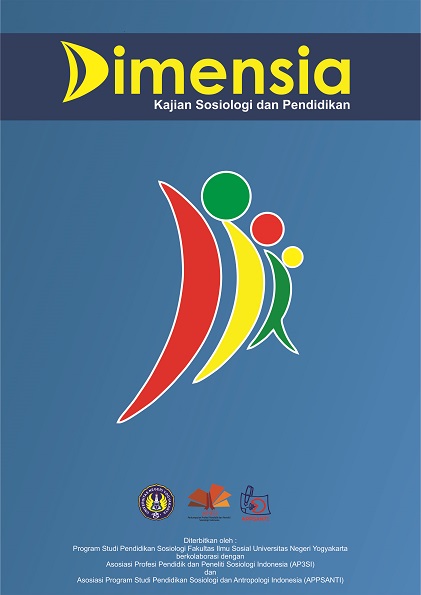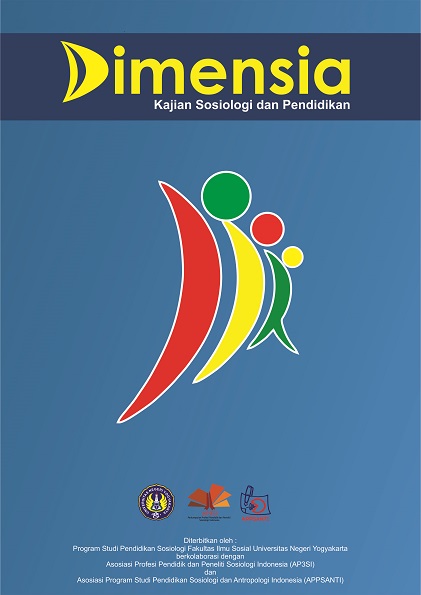Semua adalah masyarakat: intervensi paradigma monadologi Gabriel Tarde untuk radikalisasi Sosiologi
DOI:
https://doi.org/10.21831/dimensia.v13i2.68802Keywords:
Gabriel Tarde, Bruno Latour, Monad, Sosiologi, Actor-network theoryAbstract
Artikel ini merupakan upaya memperkenalkan kembali gagasan sosiolog Gabriel Tarde melalui kajian kualitatif yang dilakukan dengan metode penggalian data studi pustaka. Dari hasil penelusuran ditemukan bahwa Tarde melalui teorisasi "˜monadologi' berhasil memperluas cakupan definisi masyarakat pada segala hal yang ada ("˜everything is society'). Dari situ, artikel ini berusaha berargumen bahwa pemikiran Tarde ini menandai peralihan secara radikal diskursus sosiologi dari yang sekadar dimaknai sebagai "˜ilmu mengenai masyarakat' (science about the society) menjadi "˜ilmunya masyarakat' (the science of society). Jenis pemerian monadologi ini kemudian bisa secara praktis dipergunakan pada paradigma "˜actor-network theory' (ANT) yang banyak dikembangkan oleh Bruno Latour untuk mendorong semakin terlibatnya sosiolog dengan kenyataan sosial yang ditelitinya.
This article aims to reintroduce the ideas of sociologist Gabriel Tarde with a research that is conducted through a qualitative study using literature studies. From the research, it was found that through his theorization of "˜monadology', Tarde managed to expand the scope of society's definition to include everything that exists (thus: "˜everything is society'). From there, this article argues that Tarde's thinking marks a radical shift in sociological discourse: from being simply interpreted as "˜the science about the society' to "˜the science of society'. This type of monadological explication can then be used in the "˜actor-network theory' (ANT) paradigm that has been developed by Bruno Latour to encourage sociologists to become more involved with the social reality they study.
References
Alliez, í‰. (2004). The Difference and Repetition of Gabriel Tarde. Distinktion: Journal of Social Theory, 5(2), 49–54. https://doi.org/10.1080/1600910X.2004.9672890
Epstein, B. (2017). Social Ontology. In L. McIntyre & A. Rosenberg (Eds.), The Routledge Companion to Philosophy of Social Science (pp. 240–253). Routledge.
Halsall, F. (2016). Actor-Network Aesthetics: The Conceptual Rhymes of Bruno Latour and Contemporary Art. New Literary History, 47(2/3), 439–461. http://www.jstor.org/stable/24772788
Harman, G. (2007). The Importance of Bruno Latour for Philosophy. Cultural Studies Review, 13(1), 31–49.
Harp, R., & Khalifa, K. (2017). Realism and Antirealism. In L. McIntyre & A. Rosenberg (Eds.), The Routledge Companion to Philosophy of Social Science. Routledge.
Harris, J. (2005). The Ordering of Things: Organization in Bruno Latour. The Sociological Review, 53(1), 163–177. https://doi.org/10.1111/j.1467-954X.2005.00548.x
Katz, E. (2006). Rediscovering Gabriel Tarde. Political Communication, 23(3), 263–270. https://doi.org/10.1080/10584600600808711
King, A. (2016). Gabriel Tarde and Contemporary Social Theory. Sociological Theory, 34(1), 45–61. https://doi.org/10.1177/0735275116632558
Latour, B. (1993). We Have Never Been Modern. Harvard University Press.
Latour, B. (2005). Reassembling the Social: An Introduction to Actor-Network-Theory. Oxford University Press.
Latour, B. (2012). Gabriel Tarde and the End of the Social. In P. Joyce (Ed.), The Social in Question. Routledge.
Latour, B., Jensen, P., Venturini, T., Grauwin, S., & Boullier, D. (2012). "˜The whole is always smaller than its parts' – a digital test of Gabriel Tardes' monads. The British Journal of Sociology, 63(4), 590–615. https://doi.org/https://doi.org/10.1111/j.1468-4446.2012.01428.x
Lawson, T. (2019). The Nature of Social Reality: Issues in Social Ontology. Routledge.
Loux, M. J., & Crisp, T. M. (2017). Metaphysics: A Contemporary Introduction (4th Edition). Routledge.
Marrero-Guillamón, I. (2013). Actor-Network Theory, Gabriel Tarde and the Study of an Urban Social Movement: The Case of Can Ricart, Barcelona. Qualitative Sociology, 36(4), 403–421. https://doi.org/10.1007/s11133-013-9259-3
McLean, C., & Quattrone, P. (2006, May). On Theorizing The Object: Insights from Gabriel Tarde. Proceedings of the Meeting Gabriel Tarde: Economy, Psychology and Invention Conference.
Rosenberg, A. (2017). Functionalism. In L. McIntyre & A. Rosenberg (Eds.), The Routledge Companion to Philosophy of Social Science. Routledge.
Tarde, G. (1903). The Laws of Imitation. Henry Holt and Co.
Tarde, G. (2011). Monadology and Sociology. re. press.
Tonkonoff, S. (2013). A New Social Physic: The Sociology of Gabriel Tarde and Its Legacy. Current Sociology, 61(3), 267–282. https://doi.org/10.1177/0011392113477578
Ylikoski, P. (2017). Methodological Individualism. In L. McIntyre & A. Rosenberg (Eds.), The Routledge Companion to Philosophy of Social Science. Routledge.
Downloads
Published
How to Cite
Issue
Section
License
Penulis yang menerbitkan jurnal ini menyetujui ketentuan berikut:
- Penulis memegang hak cipta dan memberikan hak publikasi pertama kepada jurnal dengan karya tersebut secara bersamaan dilisensikan di bawah Lisensi Atribusi Creative Commons yang memungkinkan orang lain untuk berbagi karya dengan pengakuan atas kepenulisan karya dan publikasi awal di jurnal ini.
- Penulis dapat mengadakan perjanjian kontrak tambahan yang terpisah untuk distribusi non-eksklusif dari karya versi terbitan jurnal (misalnya, mempostingnya ke repositori institusi atau menerbitkannya dalam buku), dengan pengakuan atas publikasi awalnya pada tahun jurnal ini.
- Penulis diizinkan dan didorong untuk memposting karya mereka secara online (misalnya, di repositori institusi atau di situs web mereka) sebelum dan selama proses penyerahan, karena hal ini dapat mengarah pada pertukaran yang produktif, serta kutipan karya yang diterbitkan lebih awal dan lebih banyak (Lihat The Pengaruh Akses Terbuka).
====================================================
Authors who publish with this journal agree to the following terms:
- Authors retain copyright and grant the journal right of first publication with the work simultaneously licensed under a Creative Commons Attribution License that allows others to share the work with an acknowledgement of the work's authorship and initial publication in this journal.
- Authors are able to enter into separate, additional contractual arrangements for the non-exclusive distribution of the journal's published version of the work (e.g., post it to an institutional repository or publish it in a book), with an acknowledgement of its initial publication in this journal.
- Authors are permitted and encouraged to post their work online (e.g., in institutional repositories or on their website) prior to and during the submission process, as it can lead to productive exchanges, as well as earlier and greater citation of published work (See The Effect of Open Access).








